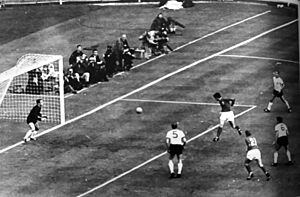Geoff Hurst facts for kids
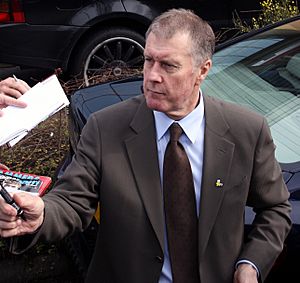
Hurst signing autographs outside Upton Park in 2008
|
||||||||||||||||||||||||||||||||||||||
| Personal information | ||||||||||||||||||||||||||||||||||||||
|---|---|---|---|---|---|---|---|---|---|---|---|---|---|---|---|---|---|---|---|---|---|---|---|---|---|---|---|---|---|---|---|---|---|---|---|---|---|---|
| Full name | Geoffrey Charles Hurst | |||||||||||||||||||||||||||||||||||||
| Date of birth | 8 December 1941 | |||||||||||||||||||||||||||||||||||||
| Place of birth | Ashton-under-Lyne, England | |||||||||||||||||||||||||||||||||||||
| Height | 5 ft 11.5 in (1.82 m) | |||||||||||||||||||||||||||||||||||||
| Position(s) | Striker | |||||||||||||||||||||||||||||||||||||
| Youth career | ||||||||||||||||||||||||||||||||||||||
| 1957–1959 | West Ham United | |||||||||||||||||||||||||||||||||||||
| Senior career* | ||||||||||||||||||||||||||||||||||||||
| Years | Team | Apps | (Gls) | |||||||||||||||||||||||||||||||||||
| 1958–1972 | West Ham United | 411 | (180) | |||||||||||||||||||||||||||||||||||
| 1972–1975 | Stoke City | 108 | (30) | |||||||||||||||||||||||||||||||||||
| 1973 | → Cape Town City (loan) | 6 | (5) | |||||||||||||||||||||||||||||||||||
| 1975–1976 | West Bromwich Albion | 10 | (2) | |||||||||||||||||||||||||||||||||||
| 1976 | Cork Celtic | 3 | (3) | |||||||||||||||||||||||||||||||||||
| 1976 | Seattle Sounders | 23 | (8) | |||||||||||||||||||||||||||||||||||
| 1976–1979 | Telford United | |||||||||||||||||||||||||||||||||||||
| Total | 561 | (228) | ||||||||||||||||||||||||||||||||||||
| International career | ||||||||||||||||||||||||||||||||||||||
| 1959 | England youth | 6 | (0) | |||||||||||||||||||||||||||||||||||
| 1963–1964 | England U23 | 4 | (1) | |||||||||||||||||||||||||||||||||||
| 1966–1972 | England | 49 | (24) | |||||||||||||||||||||||||||||||||||
| 1966–1972 | The Football League XI | 7 | (4) | |||||||||||||||||||||||||||||||||||
| Managerial career | ||||||||||||||||||||||||||||||||||||||
| 1976–1979 | Telford United | |||||||||||||||||||||||||||||||||||||
| 1979–1981 | Chelsea | |||||||||||||||||||||||||||||||||||||
| 1982–1984 | Kuwait SC | |||||||||||||||||||||||||||||||||||||
|
Medal record
|
||||||||||||||||||||||||||||||||||||||
|
||||||||||||||||||||||||||||||||||||||
| *Club domestic league appearances and goals | ||||||||||||||||||||||||||||||||||||||
Sir Geoffrey Charles Hurst (born 8 December 1941) is a famous English former footballer. He played as a striker. He is best known for being the first player to score three goals (a hat-trick) in a World Cup final. This happened when England beat West Germany 4–2 at Wembley in the 1966 final. After Sir Bobby Charlton passed away in October 2023, Sir Geoff Hurst became the last living player from England's 1966 World Cup winning team.
Hurst started his career at West Ham United. He scored 242 goals in 500 games for them. While at West Ham, he won the FA Cup in 1964 and the European Cup Winners' Cup in 1965. He later played for Stoke City and West Bromwich Albion. He also played in Ireland for Cork Celtic and in the United States for Seattle Sounders. After retiring as a player, he became a manager for teams like Telford United and Chelsea. He also coached for the England national team.
In total, Hurst scored 24 goals in 49 games for England. Besides the 1966 World Cup, he also played in UEFA Euro 1968 and the 1970 FIFA World Cup. Before focusing on football, he even played one first-class cricket match for Essex in 1962.
Contents
Early Life and Other Sports
Geoff Hurst was born in Ashton-under-Lyne, England, on 8 December 1941. His family moved to Chelmsford, Essex, when he was six years old. His father, Charlie Hurst, was also a professional footballer.
Before becoming a full-time footballer, Geoff Hurst played cricket. He played one first-class match for Essex in 1962. He also played 23 times for the Essex Second XI team. He usually played as a wicket-keeper. However, he soon decided to focus all his energy on football.
Club Football Career
Starting at West Ham United
Hurst began his football journey at West Ham United when he was 15. He joined their youth team and played alongside future England captain Bobby Moore. He became a professional player at West Ham in 1959.
At first, Hurst played as a midfielder. But in September 1962, his manager, Ron Greenwood, decided to try him as a striker. This change worked very well! Hurst started scoring many goals and formed a great partnership with Johnny Byrne.
Winning the FA Cup
The 1963–64 season was special for West Ham and Hurst. They had a tough league season but did very well in the FA Cup. Hurst scored important goals as West Ham reached the final.
In the 1964 FA Cup Final at Wembley, West Ham played against Preston North End. West Ham won the exciting match 3–2. Hurst scored his team's second goal with a header. This was a big win for the club.
European Success
Winning the FA Cup meant West Ham could play in the European Cup Winners' Cup in the 1964–65 season. They played against teams from different countries. Hurst played a key role, helping his team reach the final.
In the 1965 European Cup Winners' Cup Final, West Ham faced TSV 1860 München at Wembley. West Ham won 2–0, securing their first European trophy.
Hurst scored 40 goals in 59 games in the 1965–66 season. After his amazing performance in the World Cup, Manchester United tried to buy him for a lot of money, but West Ham refused.
"When you're playing for a team that can score seven one day and four the next it's really quite good fun. When job satisfaction is that high, why would you want to play for anyone else?"
In October 1968, Hurst scored six goals in one league game against Sunderland. West Ham won that match 8–0. Scoring six goals in a single game is a very rare achievement in football.
Moving to Stoke City
In August 1972, Hurst moved to Stoke City for £80,000. He played three seasons there. In 1973, he went on loan to Cape Town City in South Africa to recover from an illness.
Hurst helped Stoke City finish fifth in the league in both the 1973–74 and 1974–75 seasons. This was a great achievement for Stoke.
Later Club Teams
After Stoke City, Hurst joined West Bromwich Albion in 1975. He played 12 games and scored two goals before deciding to play abroad.
In 1976, he played for Cork Celtic in Ireland for a month. Then, he moved to the United States to play for the Seattle Sounders in the NASL. He was the team's second-highest scorer, helping them reach the play-offs for the first time.
International Career with England
The 1966 World Cup
Geoff Hurst made his first appearance for the England senior team in February 1966. He played well and earned a spot in the squad for the 1966 FIFA World Cup.
In the quarter-final against Argentina, England's main striker, Jimmy Greaves, was injured. Hurst was chosen to take his place. He scored the only goal of the game with a header, helping England win 1–0 and reach the semi-finals.
England then beat Portugal 2–1 in the semi-final. Hurst played well, and manager Alf Ramsey decided to keep him in the team for the final, even though Greaves was fit again.
World Cup Final Hat-trick
The 1966 FIFA World Cup Final was played against West Germany at Wembley. West Germany scored first, but six minutes later, Bobby Moore passed to Hurst, who headed the ball into the net to make it 1–1.
Later, Martin Peters scored to give England a 2–1 lead. But West Germany scored a very late goal to make it 2–2, sending the game into extra time.
In extra time, Hurst scored his second goal. His powerful shot hit the crossbar, bounced down, and was judged by the linesman to have crossed the goal line. This goal, known as the Wembley Goal, was very controversial but was given. England led 3–2.
As the game was ending, West Germany pushed forward. Bobby Moore sent a long pass to Hurst, who ran into the box and scored his third goal. The final score was 4–2 to England. As he scored, the famous BBC commentator Kenneth Wolstenholme said: "And here comes Hurst, he's got... some people are on the pitch, they think it's all over! It is now! It's four!"
Hurst became the first and only player to score a hat-trick in a Men's World Cup final and be on the winning team. This amazing feat was only matched in 2022 by Kylian Mbappé, but his team lost.
Later International Games
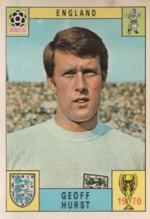
Hurst played for England in UEFA Euro 1968, where England finished third. He also played in the 1970 FIFA World Cup in Mexico. He scored the only goal in England's first game against Romania.
In the quarter-finals, England again faced West Germany. England was leading 2–0, but West Germany came back to win 3–2 in extra time. Hurst played his last international match for England in April 1972. In total, he scored 24 goals in 49 games for his country.
Managerial Career
After retiring as a player, Hurst became a manager and coach. He spent three years as player-manager for Telford United. He also worked as a coach for the England national team under Ron Greenwood.
Managing Chelsea
In 1979, Hurst became assistant manager at Chelsea, which was then in the Second Division. He soon became the main manager. In his first season, Chelsea almost won promotion to the top league, finishing fourth.
However, the next season was difficult, and Chelsea's results got worse. Hurst was sacked in April 1981.
Coaching in Kuwait
After leaving Chelsea, Hurst worked as an insurance salesman for a short time. In 1982, he returned to football to coach Kuwait SC in Kuwait. He stayed there until April 1984 before returning to his business career.
Legacy and Recognition
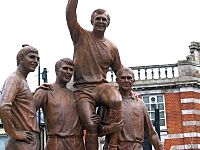
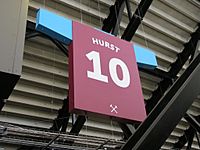
Geoff Hurst is highly respected in English football. In 2003, a statue called The Champions was made to honor the 1966 World Cup winning footballers. It features Hurst, Martin Peters, Bobby Moore, and Ray Wilson. The statue is in Newham, London, near West Ham's old stadium.
In 2004, Hurst was added to the English Football Hall of Fame. He is also one of the few footballers to have been knighted, receiving the title "Sir" in 1998 for his services to football.
A statue of Hurst was also put up outside Curzon Ashton F.C.'s ground in 2010. It shows him with two other World Cup winners from the area: Jimmy Armfield (1966 squad) and Simone Perrotta (who won with Italy in 2006).
In 2021, West Ham unveiled another statue outside their current home, the London Stadium. This statue honors Hurst, Bobby Moore, and Martin Peters for their contributions to West Ham's 1965 European Cup Winners' Cup victory.
As of late 2023, Sir Geoff Hurst is the last living player from the England team that played in the 1966 World Cup Final.
Personal Life
Sir Geoff Hurst lives in Cheltenham, Gloucestershire, with his wife Judith. They have been married since 1964. They had three daughters.
In November 2020, Hurst offered to donate his brain for research into dementia after his death. This was because several of his 1966 World Cup teammates, including Jack Charlton, Martin Peters, Ray Wilson, Nobby Stiles, and Bobby Charlton, had suffered from the disease.
Career Statistics
Club
| Club | Season | League | FA Cup | League Cup | Other | Total | ||||||
|---|---|---|---|---|---|---|---|---|---|---|---|---|
| Division | Apps | Goals | Apps | Goals | Apps | Goals | Apps | Goals | Apps | Goals | ||
| West Ham United | 1959–60 | First Division | 3 | 0 | 0 | 0 | 0 | 0 | — | 3 | 0 | |
| 1960–61 | First Division | 6 | 0 | 0 | 0 | 0 | 0 | — | 6 | 0 | ||
| 1961–62 | First Division | 24 | 1 | 1 | 0 | 2 | 0 | — | 27 | 1 | ||
| 1962–63 | First Division | 27 | 13 | 0 | 0 | 2 | 2 | — | 29 | 15 | ||
| 1963–64 | First Division | 37 | 14 | 7 | 7 | 6 | 5 | — | 50 | 26 | ||
| 1964–65 | First Division | 42 | 17 | 1 | 2 | 1 | 0 | 10 | 1 | 54 | 20 | |
| 1965–66 | First Division | 39 | 23 | 4 | 4 | 10 | 11 | 6 | 2 | 59 | 40 | |
| 1966–67 | First Division | 41 | 29 | 2 | 3 | 6 | 9 | — | 49 | 41 | ||
| 1967–68 | First Division | 38 | 19 | 3 | 1 | 3 | 5 | — | 44 | 25 | ||
| 1968–69 | First Division | 42 | 25 | 3 | 2 | 3 | 4 | — | 48 | 31 | ||
| 1969–70 | First Division | 39 | 16 | 1 | 0 | 2 | 2 | — | 42 | 18 | ||
| 1970–71 | First Division | 39 | 15 | 0 | 0 | 2 | 0 | — | 41 | 15 | ||
| 1971–72 | First Division | 34 | 8 | 4 | 4 | 10 | 4 | — | 48 | 16 | ||
| Total | 411 | 180 | 26 | 23 | 47 | 42 | 16 | 3 | 500 | 248 | ||
| Stoke City | 1971–72 | First Division | 0 | 0 | 1 | 0 | 0 | 0 | 0 | 0 | 1 | 0 |
| 1972–73 | First Division | 38 | 10 | 0 | 0 | 3 | 2 | 2 | 1 | 43 | 13 | |
| 1973–74 | First Division | 35 | 12 | 1 | 0 | 4 | 1 | 5 | 2 | 45 | 15 | |
| 1974–75 | First Division | 35 | 8 | 1 | 0 | 4 | 3 | 1 | 0 | 38 | 8 | |
| Total | 108 | 30 | 3 | 0 | 11 | 6 | 8 | 3 | 130 | 39 | ||
| Cape Town City (loan) | 1972–73 | NFL | 6 | 5 | 0 | 0 | 0 | 0 | — | 6 | 5 | |
| West Bromwich Albion | 1975–76 | Second Division | 10 | 2 | 0 | 0 | 2 | 0 | — | 12 | 2 | |
| Cork Celtic | 1975–76 | League of Ireland | 3 | 3 | 0 | 0 | — | — | 3 | 3 | ||
| Seattle Sounders | 1976 | NASL | 23 | 8 | — | — | — | 23 | 8 | |||
| Career total | 561 | 228 | 29 | 23 | 60 | 48 | 24 | 6 | 674 | 299 | ||
International
| National team | Year | Apps | Goals |
|---|---|---|---|
| England | 1966 | 11 | 7 |
| 1967 | 6 | 2 | |
| 1968 | 6 | 2 | |
| 1969 | 8 | 7 | |
| 1970 | 11 | 3 | |
| 1971 | 6 | 3 | |
| 1972 | 1 | 0 | |
| Total | 49 | 24 | |
- Scores and results list England's goal tally first, score column indicates score after each Hurst goal.
| No. | Date | Venue | Opponent | Score | Result | Competition |
|---|---|---|---|---|---|---|
| 1 | 2 April 1966 | Hampden Park, Glasgow, Scotland | 1–0 | 4–3 | 1965–66 British Home Championship | |
| 2 | 23 July 1966 | Wembley Stadium, London, England | 1–0 | 1–0 | 1966 FIFA World Cup | |
| 3 | 30 July 1966 | Wembley Stadium, London, England | 1–1 | 4–2 (a.e.t) | 1966 FIFA World Cup Final | |
| 4 | 3–2 | |||||
| 5 | 4–2 | |||||
| 6 | 16 November 1966 | Wembley Stadium, London, England | 1–0 | 5–1 | 1966–67 British Home Championship | |
| 7 | 2–0 | |||||
| 8 | 15 April 1967 | Wembley Stadium, London, England | 2–3 | 2–3 | 1966–67 British Home Championship | |
| 9 | 22 November 1967 | Wembley Stadium, London, England | 1–0 | 2–0 | 1967–68 British Home Championship | |
| 10 | 8 June 1968 | Stadio Olimpico, Rome, Italy | 2–0 | 2–0 | UEFA Euro 1968 | |
| 11 | 11 December 1968 | Wembley Stadium, London, England | 1–1 | 1–1 | Friendly | |
| 12 | 12 March 1969 | Wembley Stadium, London, England | 2–0 | 5–0 | Friendly | |
| 13 | 3–0 | |||||
| 14 | 5–0 | |||||
| 15 | 3 May 1969 | Windsor Park, Belfast, Northern Ireland | 3–1 | 3–1 | 1968–69 British Home Championship | |
| 16 | 10 May 1969 | Wembley Stadium, London, England | 2–0 | 4–1 | 1968–69 British Home Championship | |
| 17 | 3–1 | |||||
| 18 | 8 June 1969 | Estadio Centenario, Montevideo, Uruguay | 2–1 | 2–1 | Friendly | |
| 19 | 25 February 1970 | Constant Vanden Stock Stadium, Brussels, Belgium | 2–0 | 3–1 | Friendly | |
| 20 | 21 April 1970 | Wembley Stadium, London, England | 2–1 | 3–1 | 1969–70 British Home Championship | |
| 21 | 2 June 1970 | Estadio Jalisco, Guadalajara, Mexico | 1–0 | 1–0 | 1970 FIFA World Cup | |
| 22 | 21 April 1971 | Wembley Stadium, London, England | 2–0 | 3–0 | UEFA Euro 1972 qualification | |
| 23 | 13 October 1971 | St. Jakob-Park, Basel, Switzerland | 1–0 | 3–2 | UEFA Euro 1972 qualification | |
| 24 | 1 December 1971 | Karaiskakis Stadium, Athens, Greece | 1–0 | 2–0 | UEFA Euro 1972 qualification |
Managerial Statistics
| Team | From | To | Record | ||||
|---|---|---|---|---|---|---|---|
| P | W | D | L | Win % | |||
| Chelsea | 13 September 1979 | 23 April 1981 | 84 | 35 | 20 | 29 | 41.7 |
| Total | 84 | 35 | 20 | 29 | 41.7 | ||
Honours and Awards
West Ham
- FA Cup: 1963–64
- FA Charity Shield: 1964 (shared)
- European Cup Winners' Cup: 1964–65
- Football League Cup runner-up: 1965–66
England
- FIFA World Cup: 1966
- UEFA European Championship Bronze medal: 1968
Individual Awards
- West Ham United Hammer of the Year: 1965–66, 1966–67, 1968–69
- EFL Cup top scorer: 1963–64, 1965–66, 1966–67
- Ballon d'Or Nominated: 1966, 1967, 1970
- World Soccer World XI: 1967, 1968, 1969
- UEFA Euro Team of the Tournament: 1968
- Rothmans Golden Boots Awards: 1970
- Football League 100 Legends: 1998
- FWA Tribute Award: 1998
- English Football Hall of Fame: 2004
Orders
See also
 In Spanish: Geoff Hurst para niños
In Spanish: Geoff Hurst para niños
 | Jackie Robinson |
 | Jack Johnson |
 | Althea Gibson |
 | Arthur Ashe |
 | Muhammad Ali |


